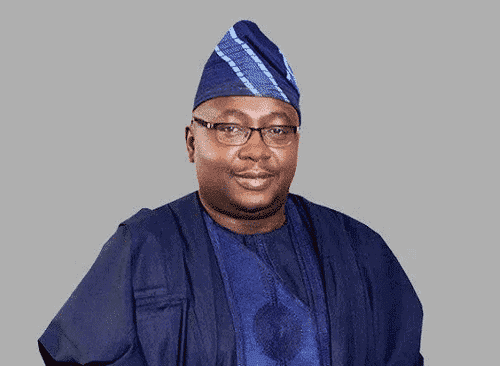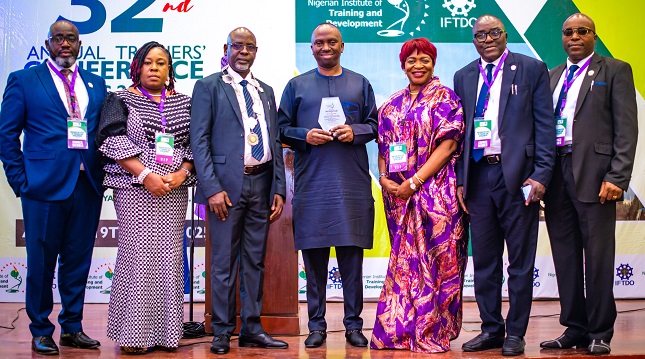News
tappi Raises $1.5M in Oversubscribed Pre-Seed Round to Build Online Trust for Africa’s SMEs

tappi, an end-to-end digital commerce SaaS solution tailored for small and medium-sized businesses, has raised $1.5M in an oversubscribed Pre-Seed round led by Mercy Corps Ventures and Chui Ventures.

With participation from Digital Currency Group, SOSV, Resilience17, growX ventures, Orbit Startups and Reflect Ventures, the investment also saw contributions from angel investors and advisors from global tech companies, including Google, Salesforce, Zendesk and the financial sector.
The early-stage funding will further tappi’s mission to empower SMEs to gain visibility and build trust in the digital commerce ecosystem as the company broadens its footprint across Africa.
Founded in 2022 by Kenfield Griffith and Louis Majanja, tappi is digitizing Africa’s $20bn SME market through software sophistication.
Offering SaaS and enterprise-grade tools to SMEs in Africa starting as low as $2/month, tappi integrates and partners with some of Africa’s largest mobile network operators and financial institutions, extending its addressable market to over 100M SMEs.
tappi embeds AI in its operations in Kenya and Nigeria, facilitating a seamless online business profile creation process through an intuitive chat experience.
Payments, Messaging, and AI are all pivotal to the company’s end-to-end digital commerce stack, which aims to be the SEO backbone to increase revenue for SMEs across the continent.
This is achieved by helping businesses gain visibility, consolidating payments with verified reviews to build online trust, and paying for online Ads with mobile airtime. Since its inception, tappi has captured verified reviews on $3M consumer transactions and engaged with over 150K consumers.
With this new funding, tappi will double down on its current markets by building a solid sales force to boost direct sales, leveraging a strong 90% retention rate. tappi will also forge strategic partnerships, building on its existing relationship with MTN Nigeria, which has seen a 19% MoM growth in business ads and business data bundle subscriptions. Further investment will also focus on talent acquisition and overall brand building.
Speaking on the round, Kenfield Griffith, tappi CEO and co-founder said, “We are grateful to be supported by great investors who share our vision and the mission to address the untapped potential within Africa’s informal SME markets, particularly in overlooked service industries such as food services, fashion, and agriculture, and health and beauty.
“We are eager to empower SMEs across Africa by providing them with a trusted identity online to find customers. The current investment will support our mission to make inroads with our customers through direct sales and partnerships across the continent.”
“There are ~44 million (M)SMEs in Africa, driving ~60% employment and ~38% of GDP on the continent. Yet, these businesses, ~60%+ women-led, remain the most underserved and vulnerable to shocks, especially those accelerated by climate change.
“While some may have access to mobile wallets, payment platforms, and online tools, few have a holistic package that offers them the ability to establish a verified digital presence, create a performance record, track income, and leverage these to increase incomes and resilience.
“Our investment reaffirms Mercy Corps Ventures’ belief in tappi, and is very much in line with our purpose of inclusivity and developing financial resilience amongst SMEs in Africa,” added Hetal Patel, Director of Investments at Mercy Corps Ventures.
In a recent 2023 Africa MSME Pulse Survey, 62% of respondents [majority from Kenya, Nigeria and South Africa] reported an increased reliance on technology and online tools.
Additionally, over 25% plan to invest in e-commerce and website development, highlighting the significant opportunity in the digital commerce ecosystem. tappi is well-positioned to meet this growing demand as it fosters trust and drives economic growth across Africa.
Lynda Saint-Nwafor, Chief Enterprise Business Officer, MTN Nigeria, said, “At MTN, we’re committed to fueling the growth of over 40 million MSMEs in our markets through tech-driven solutions.
“Partnering with tappi, we’ve launched MTN Thryve, empowering SMEs to connect with current customers and find new customers via Facebook and Instagram Ads using MTN data bundles and airtime. tappi’s technology aligns with our vision, and we’re excited to be part of SME success stories in our markets.”
News
AfDB, Aerosense Ink Agreement to Propel Drone Adoption in Africa

The African Development Bank (AfDB) and Aerosense Inc, a Japanese drone manufacturer, have inked an agreement to expand cooperation and initiatives in drone technology in Africa.

According to the AfDB, representatives from both organisations signed a Letter of Intent late last week on the sidelines of the ninth Tokyo International Conference on African Development in Yokohama, Japan.
The agreement was signed by Solomon Quaynor, AfDB’s vice president for private sector, infrastructure, and industrialisation, and Kohtaro Sabe, Aerosense’s president and CEO.
In June, the AfDB Sustainable Road Maintenance Program for Africa issued a request for proposals, and the company was chosen.
The agreement formalises a relationship of mutual cooperation, assistance, information and knowledge sharing between the two institutions, as well as the exploration of co-financing and deal opportunities and appropriate coordination of actions between them and their respective teams, with a focus on the promotion of sustainable infrastructure solutions in Africa, according to the bank.
In addition, the AfDB will assist collaboration with the public sector, lead awareness-raising initiatives, support capacity building for local partners, and investigate potential debt (and/or equity) financing support for drone deployment projects.
Aerosense will conduct demand studies for drone solutions in specific African markets, as well as technical feasibility studies for drone application, taking into account local geographical factors, and investigate potential deployment options based on positive feasibility study results.
“The program is a bold response to Africa’s growing infrastructure challenges. By partnering with Aerosense, we will not only promote efficient road management but also consider promoting other unique solutions such as disaster management, river/flooding control, agricultural sensing, and medical equipment delivery,” said Quaynor.
For Sabe, the project is about leveraging multinational technological solutions to address African challenges.
He said: “It is a great honour to serve the people in Africa with our Japanese technology for enhancing their quality of life. We are looking forward to collaborating with AfDB to build a better future together in a concrete manner.”
News
Nigeria Taps $190M JICA Loan to Power Underserved Communities

Nigeria is seeking a $190 million renewable energy loan backed by the Japan International Cooperation Agency (JICA), according to Adebayo Adelabu, minister of power.

Minister Adebayo-Adelabu
In a statement released by the ministry on Saturday, Adelabu disclosed the plan during the 9th Tokyo International Conference on African Development (TICAD 9) in Yokohama, Japan, where the Nigerian delegation led by President Bola Tinubu held high-level discussions on power, infrastructure, and industrial transformation.
Adelabu said the facility is aimed at scaling distributed renewable energy solutions across underserved communities. “This builds on the recently launched $750 million World Bank Distributed Access through Renewable Energy Scale-up (DARES) programme under the Mission 300 Compact, which aims to bring clean and reliable electricity to more than 17 million Nigerians,” the ministry said.
The minister also held talks with Japanese corporations including Toshiba, Hitachi, Japan’s transmission and distribution corporation, and energy exchange corporations. Discussions focused on strengthening transmission infrastructure, improving operational efficiency, and cutting system losses.
The ministry said these engagements build on recent Federal Executive Council approvals for counterpart funding of N19.08 billion to unlock a $238 million loan from JICA. The loan will finance the expansion of the national grid, including the construction of over 200km of new 330kV and 132kV double circuit lines, six new substations, and extensions to existing facilities.
Three substations funded through a $32 million JICA grant—located in Apo (FCT), Keffi (Nasarawa), and Apapa (Lagos)—are also set for commissioning, a move expected to boost supply reliability for households, industries, and business hubs, including the Lagos Port.
Speaking during a panel session themed “HICKARE Africa: Harnessing Innovation, Co-creation, and Knowledge for Accessible and Resilient Energy for Africa”, Adelabu highlighted Nigeria’s energy gap, noting that only 55–60 percent of the population currently has access to electricity, much of which is unreliable.
He outlined the government’s approach to expand grid access in urban areas while accelerating off-grid solutions such as solar mini-grids and standalone systems in rural and peri-urban communities. He pointed to challenges including limited access to affordable capital, high costs for rural households, and the under-utilisation of productive-use equipment.
Despite these hurdles, the minister reaffirmed the government’s commitment to reforms through supportive policies, private-sector collaboration, and increased local manufacturing of renewable energy components.
Adelabu commended JICA and the Japanese government for their “long-standing support” to Nigeria’s power sector, praising their contributions to infrastructure, training, technical studies, and financing. He expressed optimism for deeper partnerships between both countries in driving Nigeria’s energy transition.
News
Banigbe, T2 CEO says Nigeria’s Growth Hinges on Learning, Innovation, and Afrocentric Content

Obafemi Banigbe, chief executive officer of T2, has stressed that Nigeria’s long-term economic transformation depends on continuous upskilling, digital learning, and workforce adaptability.

Speaking as Special Guest at the 32nd Annual Trainers’ Conference (ATC 2025) of the Nigerian Institute of Training and Development (NITAD), held recently at the Shehu Musa Yar’Adua Centre, Abuja, Banigbe warned that without deliberate investment in human capital and technology-driven innovation, the nation risks lagging behind in a rapidly evolving global economy.
Drawing from personal reflections, practical insights, and a forward-looking vision, Banigbe urged Nigerians to reimagine approaches to learning, work, and growth in order to build a prosperous, inclusive, and innovation-led society.
He emphasized that the traditional model of “learning once and working forever” is obsolete.
“With Nigeria projected to become the world’s third most populous nation by 2050, and 70 percent of its citizens under 30, the need for continuous upskilling, digital learning, and adaptability is not optional, it is existential,” he stated.
Banigbe underscored the importance of democratizing access to digital tools, ensuring that every Nigerian child has the same opportunities as peers in developed economies.
He called for the creation of Afrocentric educational content, including culturally relevant cartoons, to help children learn science, mathematics, and history through familiar cultural references rather than foreign identities that disconnect them from their environment.
He also urged a national shift away from a culture that prizes certificates and training hours to one that rewards competence, innovation, and problem-solving.
He envisioned a civil service and workforce driven by solutions rather than processes, stressing that while artificial intelligence may analyze and automate, it cannot dream, uphold ethics, or create new nations, a reminder of the enduring human advantage.
Banigbe further encouraged adoption of cost-effective training models such as online platforms, virtual cohorts, and open-source learning, while acknowledging the continued value of global exposure where local resources fall short.
During an interactive question and answer session, he addressed concerns around affordability, accessibility, and the role of self-driven digital education in shaping Nigeria’s future-ready workforce.
He assured participants that T2 itself is on a path of transformation, committed to delivering world-class services as a proudly Nigerian brand.
In recognition of his contribution to national dialogue and thought leadership, the President of NITAD, James Bulus, presented Banigbe with an Award of Excellence.

 E-Financial3 days ago
E-Financial3 days agoFBNQuest Merchant Bank Facilitates Landmark ₦5Bn Commercial Paper Programme for Accion Microfinance Bank

 E-Business3 days ago
E-Business3 days agoNDPC Begins Probe of Banks, Others for Data Breaches

 Telecom3 days ago
Telecom3 days agoDigital Realty Commits to Africa’s Digital Transformation @ Launch of LKK2 Data Center

 E-Financial3 days ago
E-Financial3 days agoUBA to Deepen Financial Inclusion, Boost Savings’ Culture with Super Savers’ Promo

 Telecom3 days ago
Telecom3 days agoIntel–U.S. Partnership Reshapes Semiconductor Landscape with Historic Equity Agreement

 E-Financial3 days ago
E-Financial3 days agoFidelity Bank Resumes Intl Transactions on Naira Debit Cards

 Telecom3 days ago
Telecom3 days agoNITDA Alerts Nigerians to eSIM Security Flaw Deployed to Hijack Devices Worldwide

 E-Financial3 days ago
E-Financial3 days agoNigeria Leads Africa in Stablecoin Adoption with $22Bn in Transactions
























